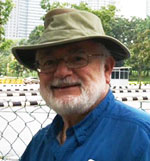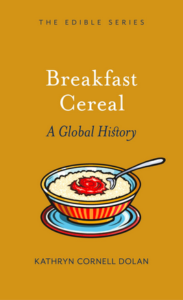By Oliver B. Pollak

RICHMOND, California – I like porridge, cream of wheat, and semolina. It’s a nice starter for cold weather. I remember the advertising ditty, “Its cream of wheat weather, we repeat, so guard your family with hot cream of wheat.”
In 2005 we were in San Francisco for a wedding. We breakfasted at Boulettes Larder in the Ferry Building. They served designer porridge with several grains, pine nuts, beautiful raisins, and as often happens I smelled a story. In November 2008 the University of Chicago Press and Reaktion Books advertised the first three volumes of The Edible Series, A Global History. In December 2008 I had a contract to write Porridge. I wrote 19,000 words by March 2009 and stopped. I looked at it again in 2014 and wrote, “It is better than I remembered,” but did not resurrect it.
Reaktion Books has just published Breakfast Cereal by Kathryn Cornell Dolan, an Associate Professor in the Department of English and Technical Communication at Missouri University of Science and Technology in Rollo, Missouri. Her first chapter is “Porridges Around the World.”
 Almost all societies with heat resistant clay containers and grains, including barley, millet, oats, corn, maize, wheat, rice, and lentils, have made porridge. Scottish porridge and Quaker Oats are ubiquitous. China and Korea have rice based congee and juk, India has dalia, and Zimbabwe, sadza.
Almost all societies with heat resistant clay containers and grains, including barley, millet, oats, corn, maize, wheat, rice, and lentils, have made porridge. Scottish porridge and Quaker Oats are ubiquitous. China and Korea have rice based congee and juk, India has dalia, and Zimbabwe, sadza.
Professor Dolan, relying on the 1611 King James Bible version of Genesis 25:29-34 recites the story of Esau, suffering in modern terms from “food insecurity,” sold his birthright to his younger brother Jacob. The English translations in the King James Bible, the 1960 Second edition of The Soncino Press Pentateuch and Haftorahs edited by Anglophile Chief Rabbi of the British Empire, Dr. J. H. Hertz, and Etz Hayim Jewish Publication Society of America 2001 translations are worth comparing.
The King James version and Etz Hayim (2001) say Esau is “famished.” Hertz says he was “faint.” According to King James the food in question was “red pottage”; Hertz – “Let me swallow, I pray thee, some of this red, red pottage; for I am faint.” Etz Hayim – “Give me some of that red stuff to gulp down, for I am famished.”
Jacob took advantage of Esau’s neediness. Esau stressed with hunger offers up his right to inherit from their father Isaac. Esau sold his birthright according to King James and Hertz for “bread and pottage of lentils” and Etz Hayim for “bread and lentil stew.” King James and Hertz concur “Esau despised his birthright.” Etz Hayim, “Thus did Esau spurn the birthright.”
The word pottage, according to the Oxford English Dictionary appeared around 1200 and was joined by porridge in the early 16th century. Both refer to thick soup or stew boiled in water.
And Etz Hayim called it “stew” which would have been cooked in a clay pot.

The book is well illustrated and includes “Esau and the Mess of Pottage” painted in 1653 by Dutch painter Jan Victors (1619-1676), famous for biblical scenes.
Esau made a bad bargain surrendering his birthright for a serving of red stew, lentil, or pottage.
“Lentil Porridge,” Mujadara Makhbousa, is a savory Lebanese porridge made with red lentils and rice which I had the pleasure of eating in Jerusalem about 10 years ago, and more recently in Bay Area Palestinian and Lebanese eateries.
Gil Marks in Encyclopedia of Jewish Food (2010) devotes a full page to Mujaddara. The oldest recipe is a ninth-century Persian-inspired one that survives in a 1226 Iraq recipe book. It is “the most widespread and beloved rice and legume dish in the Muslim world” and is “traditionally eaten during the Nine Days before the fast of Tisha b’Av and in a house of mourning.” Finally, “for many Middle Eastern Jews, mujaddara is the ultimate comfort food.”
The author devotes one paragraph to “Kasha: Asia, Europe, Africa.” The Yiddish word kasha is defined as “a type of thick soup or stew, especially thickened with barley.”
The Edible Series has grown from three volumes in 2008 to about 90 volumes with “Breakfast Cereals” fitting between Apples and Yoghurt. While I wish I had moved beyond my 19,000 words in 2009 and endured rewriting, revising, reorganizing, fixing snags, and delivering the manuscript in a timely manner, I am pleased, nay thrilled, to see how another scholar has successfully envisioned and completed a project that I had not.
*
Oliver B. Pollak, Ph.D., J.D., professor emeritus of history at the University of Nebraska at Omaha, a lawyer, and a member of the Institute of Historical Study, is a correspondent based in Richmond, California. He may be contacted at oliver.pollak@sdjewishworld.com.